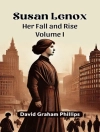In ‚Scarlet and Hyssop, ‚ E. F. Benson masterfully weaves a narrative that explores the intricacies of human relationships against the backdrop of Edwardian society. The novel employs a vivid literary style characterized by sharp prose and rich, atmospheric descriptions that capture both the charm and decay of its setting. Through its multifaceted characters, Benson delves into themes of desire, morality, and social conventions, creating a tapestry of emotional conflict that invites readers to reflect on their own values and aspirations. The dialogue is laced with wit and irony, typical of Benson’s work, making the reader both entertained and contemplative. Benson, an accomplished author and social commentator of his time, was a member of a prominent literary family and had a keen understanding of the societal norms that governed Edwardian life. His own experiences with sexuality and friendship heavily informed his writing, enabling him to portray the tension between personal desire and societal expectations in a profound manner. This personal connection lends authenticity to the emotional struggles faced by his characters, illuminating the complexities of their inner lives. I highly recommend ‚Scarlet and Hyssop‘ to readers interested in a nuanced exploration of human nature set within a richly depicted historical landscape. Benson’s sharp insights and engaging prose not only entertain but also invite deeper contemplation about the forces that shape individual destinies in a constricting society.
Über den Autor
Edward Frederic Benson (1867–1940) was a prolific English novelist, biographer, memoirist, and short story writer, best known for his charming and satirical Mapp and Lucia series. Educated at Marlborough and King’s College, Cambridge, Benson enjoyed a successful writing career that spanned several genres, but he often gravitated towards the humorous and the supernaturals. His keen observation of social manners and an incisive wit characterize his work, notably in the astute social commentary found in ‚Scarlet and Hyssop‘ (1902), which explores the themes of morality, social status, and hypocrisy in Edwardian society. Benson’s exploration of such themes was not without critical acclaim; his depictions of contemporary mores were both sharp and insightful, earning him a distinct place within the canon of English literature. His literary style blends a light narrative touch with a certain psychological depth, a combination that served him well in both his humorous and more serious works. Over the course of his life, Benson published more than one hundred books, including historical and biographical works, though it is his novels and highly regarded ghost stories that endure as his most celebrated contributions to English literature. Benson’s legacy is also marked by his presidency at the Society of Authors, highlighting his commitment to the literary community and his influence extending beyond his own written words.












